THE HINDU – CURRENT NOTE 20 January
G.S-01
 U.K. seeks Indian help in resolving Chagos Archipelago dispute
U.K. seeks Indian help in resolving Chagos Archipelago dispute

- The British Foreign Secretary has sought Indian assistance in resolving current tensions between the U.K., the U.S. and Mauritius over the future of the U.S. military base Diego Garcia, and the Indian Ocean Chagos Archipelago.
- A warning from Mauritius last year that it would push to take the matter to the International Court of Justice.
- In India’s interest:
- Ensuring the future of Diego Garcia would be in India’s security interest in the region.
- The Chagos Islands — referred to by the British as the British Indian Ocean Territory, but which is not recognised as such by Mauritius — is home to the U.S. military base Diego Garcia.
- In the 1960s and 1970s, inhabitants were removed from the islands. Mauritius maintaining that the archipelago remains its integral part.
- Mauritius holds legally binding rights to fish in the waters surrounding the Chagos Archipelago, to the eventual return of the Chagos Archipelago to Mauritius when no longer needed for defence purposes, and to the preservation of the benefit of any minerals or oil discovered in or near the Chagos Archipelago pending its eventual return.
- In March 2015, a tribunal brought against the U.K. under the UN Convention on the Law of the Sea found that the Marine Protected Area brought in by the U.K. around the Archipelago in 2010 (but not including Diego Garcia) was not compatible with Britain’s obligations under the convention.
- In November, 2016 U.K. government announced in Parliament that it had ruled out the resettlement of the islanders on the grounds of “feasibility, defence and security interests… and the cost to the British taxpayer”. It also renewed the lease for Diego Garcia, up until 2036.
- The Mauritius government reacted furiously following the November announcement.
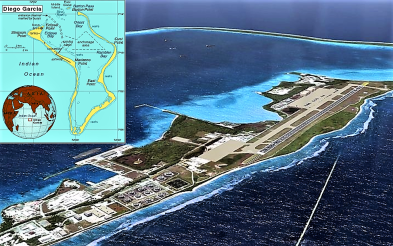
- A positive move
- The British — acting on the request of the U.S. — are hopeful that India may be able to exercise its influence with the Mauritian government to help the three sides come to some agreement, to prevent the situation from escalating.
- While India has maintained that the matter of whether or not to proceed with the UN General Assembly move is a decision for the Mauritian government to make, the approach by the U.K. is seen by the Indian side as a positive move, signalling Britain’s eagerness to partner with India on security matters in the region.
 Jallikattu protests snowball, bandh today
Jallikattu protests snowball, bandh today
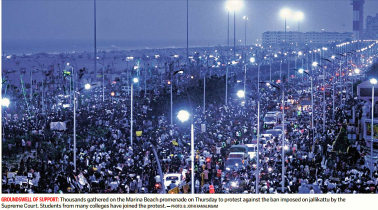
- Mass protestors on third day demand the Centre and the Tamil Nadu government take legal steps to hold jallikattu.
- Chennai getting ready for dawn-to-dusk bandh on Friday; holiday declared by schools in Chennai, south Tamil Nadu.
- Asserting identity:
- Thousands of people, predominantly students pressed on with their strong uprising against the Centre to redeem ‘Tamil identity and culture.’ reminiscent of the anti-Hindi agitation in the 1960s, also fuelled by students.
- It started as a social media protest for jallikattu which turned into a massive movement — peaceful, self-regulated and leaderless.
- Agitators vent their ire on Modi, Panneerselvam; politicians kept out of uprising driven by social media.
 TN can enact law to treat jallikattu as traditional sport
TN can enact law to treat jallikattu as traditional sport
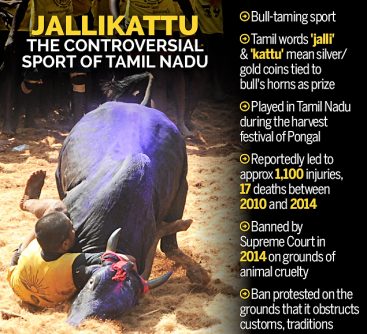
- The Attorney-General said that the State government has the power to enact a law to treat jallikattu as a traditional sport. As it came under the exclusive jurisdiction of the State as per the Constitution.
- The law can allow the sport subject to stringent conditions that there will not be anybody at a distance of 100 feet, nobody can throw stones or do any acts of cruelty and if the same are found to be done, then there can be punishment, so that the concerns of the Supreme Court rendered in the judgment, the concerns about cruelty, are also kept in view and a balanced position can be found by the State.
- Regarding the Prevention of Cruelty to Animals Act is a central law which can be amended by Parliament but if it is a sport in a local area, “let the State make the law relating to the sport minus any cruelty, with stringent punishment” for those who commit cruelty.
G.S-02
 EC seeks more details on budget presentation
EC seeks more details on budget presentation

- The Election Commission has asked the Govt. to furnish details on the procedure followed by the then UPA-II government for postponing the Union Budget presentation in 2012.
- Opposition parties demanding that the Budget presentation be postponed in view of the Assembly elections in five States. They alleged that Budget announcements might help the ruling party influence voters.
- Central government response:
- The Union Budget is an annual constitutional exercise and it covers the entire country.
- It also stuck to its decision to advance the Budget presentation arguing that it was done to ensure that the budgetary allocations were made well in time, allowing various sectors to expedite implementation of government projects.
- This year, the Budget session is to start from January 31 and the next day, the Union Budget and the Economic Survey are scheduled to be presented.
 ‘Church courts’ cannot veto divorce law, says Supreme Court
‘Church courts’ cannot veto divorce law, says Supreme Court

The Supreme Court said Canon law and decrees of divorce given by ecclesiastical tribunals or ‘Church Courts’ cannot veto the statutory law of divorce.
1996 verdict:
- The SC 1996 judgment on Molly Joseph versus George Sebastian upholding the binding nature of the Indian Divorce Act of 1869, which governs divorce among Christians.
- The implication of the Canon law is confined to either theological or ecclesiastical, but has no legal impact on the divorce or annulment of marriage between two persons professing the Christian religion.
- After the Divorce Act came into force, a dissolution or annulment under such personal law cannot have any legal impact as statute has provided a different procedure and a different code for divorce or annulment.

- Triple talaq argument
- In petition it was argued that when courts can recognise dissolution by triple talaq under the Mohammedan personal law, they should also recognise the Canon law as the personal law of Indian Catholics.
- It also asked why courts prosecute Roman Catholics under Section 494 of the Indian Penal Code for the alleged offence of bigamy without considering the Canon law.
- The petitioner, had contended that the case touched the lives of over one crore citizens “who are Indian Christians/ Catholics governed by the Code of Canon Law both regarding marriage and its dissolution.”
- The court is presently hearing a row of petitions, including a suo motu one, on whether practices of Islamic personal law like triple talaq and polygamy discriminate against Muslim women.
- Marriage & dissolution:
- The Canon law enjoins that Catholics are required to marry in a Catholic church and equally enjoins that they seek nullity in the canonical court (ecclesiastical court/ tribunal) also under the Code of Canon Law. Otherwise, the marriage and the dissolution will not be recognised by the Catholic Church.
 Safe childhoods for a safe India
Safe childhoods for a safe India
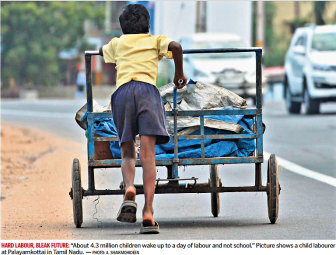
- Government of India ratifies the International Labour Organisation (ILO) Convention 182 on the worst forms of child labour and Convention 138 on Minimum Age of Employment. About 4.3 million children wake up to a day of labour and not school. Another 9.8 million are officially out-of-school.
- Child labour perpetuates illiteracy and poverty. It is the root cause of organised crimes such as human trafficking, terror and drug mafia.
- An African epiphany:
- It was the language of compassion and humanity that would help accelerate the global movement against childhood exploitation.
- The Global March Against Child Labour, began in January 1998 from Abuja, the capital city of Nigeria traversed 80,000 kilometres across 103 countries and became a strong group of 7.2 million marchers culminated finally in Geneva on 1st June with ILO conference.
- The voice of the marchers demand for an international convention to ban the worst forms of child labour was heard and reflected in the draft of the ILO Convention 182.
- In June 1999, delegates of the ILO unanimously adopted the convention. It was the first time that a convention or treaty had been adopted with the full support of all members.

- Clearing the hurdles:
- The main problem in the way of India ratifying Conventions 182 and 138 [two of the eight core labour conventions] was addressing forced or compulsory recruitment of children and appropriately raising the age of employment in hazardous occupations from 14 to 18 years.
- The Child Labour (Prohibition and Regulation) Amendment Bill, 2016 by the Indian Parliament prohibiting the employment of children up to 14 years of age, and children up to 18 years of age in hazardous occupations.
- The government will take immediate and effective measures to prohibit and eliminate the worst forms of child labour: child slavery (including the sale and trafficking of children, debt bondage, and forced recruitment for armed conflict), child prostitution and their use in pornography, use of children for illicit activities such as drug trafficking, and exposure to any hazardous work which is likely to harm the health, safety or morals of children.
- Under the provisions of the ILO Conventions 182 and 138, India will not adhere to a fixed deadline by which the worst forms of child labour must be eliminated. It will ultimately depend on the level of moral courage, public concern, social empathy, political will and the implementation of resources invested in the development and protection of children.
 80% IS suspects educated in schools, not madrasas were in the 25- 40 age bracket
80% IS suspects educated in schools, not madrasas were in the 25- 40 age bracket

- As per National Investigation Agency ( NIA) that 80% of the persons arrested for alleged links to the Islamic State ( IS) went to formal schools and only 20% had studied at madrasas ( Islamic seminaries).
- NIA arrested 52 persons for allegedly plotting terror attacks and being part of the banned outfit in 2016.
- 47 of the accused were from the Sunni sect of Islam and 5 had converted from Hinduism and Christianity.
- 50% of the suspects were followers of Ahle Hadith ( or Salafis/ Wahabis who follow the puritanical form of Islam promoted by Saudi Arabia).
- 30% followed Tablighi Jamaat ( Sunni Islamic movement).
- Only 20% were Deobandis ( Islamic school based in Saharanpur, Uttar Pradesh) and none of them was from the Barelvi sect.

Social Background:
- An analysis of their educational qualifications indicated that 20 were graduates and had professional degrees, 12 were diploma holders, 13 had done their matriculation, 4 studied till the senior secondary level and three were post- graduates.
- 30 were from the middle- income group, 9 from the upper- middle- income group and 13 from the lower- income group.
 Proximity rule unconstitutional, unfair to minorities: HC
Proximity rule unconstitutional, unfair to minorities: HC
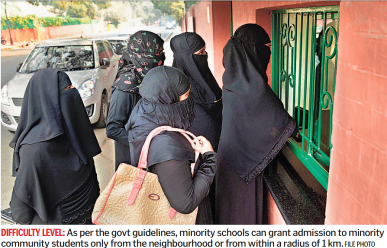
- The Delhi High Court termed AAP government’s guidelines to minority unaided schools to grant admission to minority community students only from the neighbourhood or from within a radius of 1 kilometre as “Unconstitutional”.
- It is against the settled principle of law as per Article 13 of the Constitution.
- Inclined to grant stay:
- The HC grant a stay on the January 7 notification of the Delhi government in favour of minority schools.
- The petitions were filed by Mount Carmel School and Somerville School against the government notification that the private schools on government land will have to compulsorily admit students from within one kilometre radius.
- Directive unlawful:
- This is against the basic structure of the Constitution. The law and the Supreme Court judgments that gave authority to minority institutions was to ensure that the minorities do not feel alienated.
G.S-03
 Textile industry seeks 5% duty under GST
Textile industry seeks 5% duty under GST

- The textile industry wants a uniform duty of 5% under the Goods and Services Tax (GST).
- The Centre had announced special packages for the apparel sector in June last year and for made-ups (an article manufactured and/or stitched from any type of cloth, other than a garment) in December.
- It is expected there will be no changes in the optional CENVAT that is implemented now.
- The textile and clothing sector has sought the lowest duty slab of 5% without exemptions for any segment of the value chain, according to industry representatives.
- About 60% of the Indian textile industry is cotton-based and 80% of textile and clothing exports are also cotton-based.
 Airlines yet to collect cess for regional fund Centre to keep options open on funding the scheme
Airlines yet to collect cess for regional fund Centre to keep options open on funding the scheme
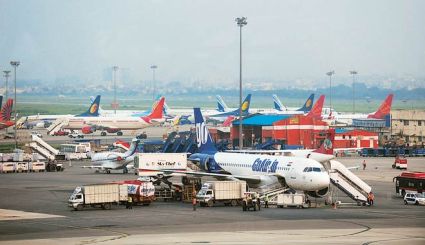
- Most of the domestic airlines have refused to charge a levy on air tickets that will finance the regional connectivity fund.
- The Centre will explore other efficient means to fund the scheme if domestic airlines do not come on board, as the Centre wants to start services under the regional connectivity scheme by March.
- Counter bids
- The Centre has received 45 proposals from 11 bidders covering more than 200 routes under its regional connectivity scheme.
- 15 of them have agreed to provide all the requisite infrastructure concessions along with the balance 20% subsidy for flight operations under the regional connectivity scheme.
- It has now invited counter bids against these initial proposals that cover 65 under served or unserved airports.
- The Scheme:
- Under the scheme, the Centre will subsidise the losses incurred by the airlines in flying out of airports with low passenger volumes.
- The airlines will be allowed to charge passengers ₹2,500 for an hour’s flight. About 80% of the subsidy will be collected from the airlines that will charge a levy of up to ₹8,500 on each departing flight. The balance 20% will come from the respective state governments.
- Legal tangle:
- The Federation of Indian Airlines, which represents IndiGo, Jet Airways, SpiceJet and GoAir, has dragged the Centre to the courts challenging the levy of up to ₹8,500 on domestic flights from 1st
- The Delhi High Court will now hear the airlines’ plea on February 1.
 Centre awards ₹60.9 crore as prize money for digital payments
Centre awards ₹60.9 crore as prize money for digital payments

- The Centre has so far awarded ₹60.9 crore as prize money to over 3.81 lakh consumers and 21,000 merchants under its two lucky draw schemes – Lucky Grahak Yojana and Digi-Dhan Vyapar Yojana – announced to boost digital payments post demonetisation, unveiled on December 25 and will remain open till April 14.
- Maharashtra, Andhra Pradesh, Tamil Nadu, Uttar Pradesh and Karnataka have emerged as the top five states with the maximum number of winners in the age group of 21-30 years.
- Inculcating digital:
- Over 100 Digi-Dhan Melas will be held across the country “to inculcate digital payment among the people”.
- About 24 Digi-Dhan Melas have been held across the country so far since December 25.
- The Common Service Centres (CSCs) have so far trained about 1.94 crore citizens and 5.93 lakh merchants on transacting using digital payment systems.
- Upgrading infrastructure:
- National Informatics Centre or NIC is the technology infrastructure arm of the government and plays a key role in Digital India.
- As a pilot project, 150 District NIC offices would be upgraded during 2017-18.
 No demand from IAF; India goes slow on Hawk variant
No demand from IAF; India goes slow on Hawk variant

- Hindustan Aeronautics Limited (HAL) and BAE Systems have teamed up to develop the combat variant, which will be a slow flying, ground support aircraft. The two had signed a Memorandum of Understanding (MoU) in the past to explore the possibility.
- Development of a combat variant of the Hawk Advanced Jet Trainer (AJT) slows down as there has been no demand for it from the Indian Air Force.
- India had contracted 123 Hawk Mk-132 AJT aircraft from BAE Systems of the U.K. for the IAF and the Navy. Another order for 20 aircraft to equip the Surya Kiran aerobatics team is in an advanced stage.
- HAL is assembling the Hawks in India under a license.
- Under the new plan, the idea is to equip the Hawk jet with air-to-air and air-to-ground missiles, rockets and bombs to transform it into a combat platform.
- Discussions are under way between HAL and BAE Systems to work out the model of development of the advanced Hawk.
